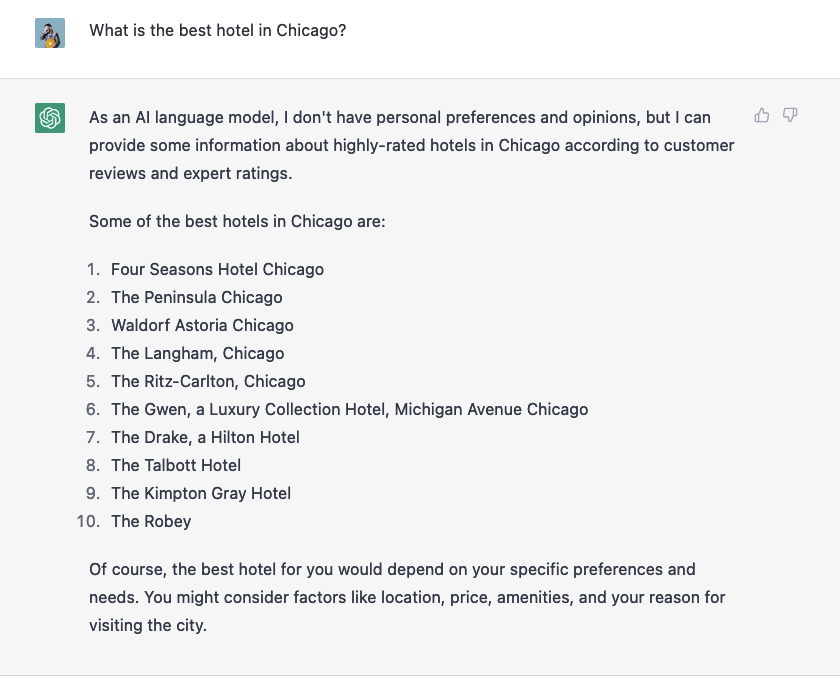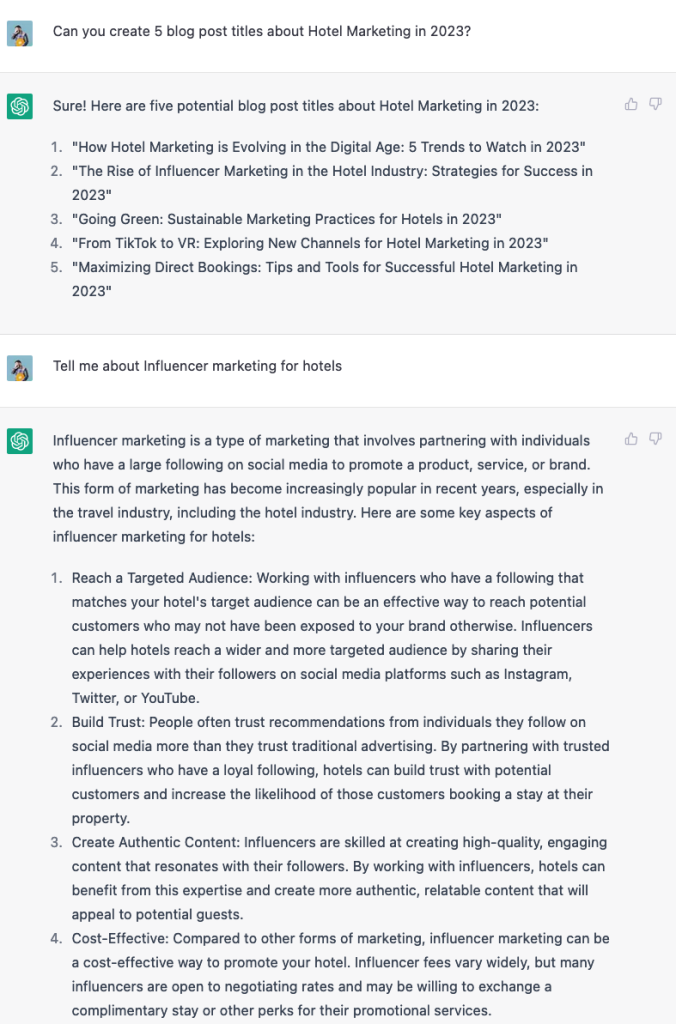SEO Fundamentals VS the AI Bots of 2023
Discover how AI chatbots are impacting parts of the SEO landscape and how to stay ahead of the game in 2023.

AI-Generated Image By OpenAI’s Dalle-2
Promt: Robot portrait, film photograph from 1976
The AI bots of today are unsettling and fascinating. As much as the bots receive hype, they are prone to biases, oddities, and sometimes provide incorrect answers. You might have seen how Google lost $100 Billion because they rushed their bot “Bard” to beta. Google widely advertised an incorrect fact in their first public announcement, and shareholders were spooked. Moments like this are leaving many of us in the web dev community scratching our heads. Can this really upset everything today? Maybe, we are simply witnessing the slow beginning of an AI-assisted world.
For those readers who have missed this nerdy side of the news cycle, artificial intelligence (AI) bots, such as ChatGPT by OpenAI, are powerful computer programs that can chat with you. They scrape a massive number of web pages for information, digest it, and impressively perform intelligent conversations with people. These bots can also help create content, summarize complex topics, write code, and even come up with some odd, original stories. Thankfully, they are not conscious! Yet…
Today, I want to dive into only one of the many spheres AI is affecting: Search Engine Optimization.
At the end of the day, we are undeniably humans using tools to engage with other humans.
I’ve been working on websites and SEO campaigns since 2012. I have to admit, a lot has changed, but a lot hasn’t. The rise of zero-click search and a multitude of algorithm updates have caused some momentary panics in the past, especially when the weights of key SEO ingredients have been tweaked. However, the key fundamentals are still holding strong. At the end of the day, we are undeniably humans using tools to engage with other humans. We continue to use the internet as a tool for answers and finding community. No search engine has fundamentally shifted our nature. When we open a search engine we have one of four basic intents: Navigational, Informational, Commercial Investigation, or Transactional.
Credit: SEM Rush
It might become clear from that list that AI bots are going to help search users primarily with information, as anything subjective is a struggle for AI. Guiding a user through the personal aspects of purchasing an item or service is not going to be possible until legitimate AI consciousness is achieved. Humans want to make decisions and ask specific questions about how that choice will impact day-to-day life. Because of this, the idea that an “AI will destroy search engines” feels a bit hyperbolic. Most digital marketers can feel a shift and some are expecting something big, but it may feel more natural than we expect.
Search engines like Google are rightfully afraid
If users trust AI chatbots for basic everyday questions, the informational market share for search engines will dwindle. Subsequently, less search traffic means search engines will be losing out on advertising revenue. It will not destroy something as massive as Google. A giant like Google can simply shift their business models to offer a hybrid of AI chat and search. If anyone has been watching Google Assistant, Alexa, and Siri updates for the last 5 years we all knew this kind of reality was coming anyways. According to SimilarWeb, Google is still the most visited website in the world with 88.3 Billion visits a month, whereas ChatGPT is currently at 616 million. Comparatively, that’s about 0.07% of the size of google’s market share. Sounds a lot less like a boogie man now, right? I’m not saying ChatGPT, or one of the alternatives, can’t become something disruptive, but it’s far too early to panic. Let’s calmly prepare for what it’s probably going to be.
If you are a small, medium, or large business selling services or products, AI bots can help you educate your future customers by aiding in content creation and keyword research. Bots can even be trained to help chat directly with customers for support. However, they will not be able to follow through on your business deliverables for the foreseeable future. That’s why building sites following SEO best practices is still going to work for a very long time.
These SEO Fundamentals Still Work in 2023
(and bots need them to work too)
Now let’s refresh ourselves on the SEO fundamentals that still work. Then let’s talk about how AI tools can help and fall short.
TOP SEO FUNDAMENTALS:
Focus on creating quality content
From the first days of SEO to today, this fundamental is the bedrock of all SEO efforts. Search engines and amazing AI bots get their information from solid resources on the internet.
Build strategies around the keywords people actually search.
Use tools like SEM Rush, Moz, or Google Keyword Planner, to find keywords with moderate search volumes and some length. Typically, high-volume single-word keywords are dominated by information resources like Wikipedia. Focusing on longer intent-driven keywords yields better results.
I.e. Marketing vs Full-Service Marketing Agency
Pay close attention to your chosen keywords’ intent and gather a healthy mix of information, commercial, and transactional keywords to guide content plans.
Always be seeking ways to earn links.
Links to your site give it authority and trustworthiness to search engines. The most reliable way to build links over time is by creating quality content that earns links. The second most reliable way is to foster relationships with customers and business partners in the real world. Build a community.
Optimize for mobile phones
This one is common sense now. At least 60% of web interactions today are completed using a mobile device, depending on which market report you pick up. Your content should look amazing on a phone first.
Optimize for page speed
If your site isn’t loading fast, search engines will not rank it well. The search engine business model is focused on providing engaging content to keep users coming back. Delivering poor user experiences hurts your website and search engines see it as a threat to their user experience too.
Create business profiles on maps, search, and social media.
Proving that you exist and have physical locations across multiple platforms helps search engines trust you. Also, the better reviews you collect on each platform the better you look.
Do the basics of technical SEO optimization.
Optimize your site’s page titles, meta descriptions, and schema for your primary keywords.
When websites successfully become the resource their visitors and customers seek, AI bots benefit too. Most of the knowledge ChatGPT summarizes and regurgitates comes from the vast number of websites it scrapes. So in one way, they need humans out there making quality content or the bot won’t have fresh quality answers for their users.
As you can see bots on a basic level take and reformat information. Therefore they don’t know how to guide or help customers in the decision-making process outside of fact-finding.
For example: check out this test asking Chat GPT to help me find the “Best Hotel In Chicago”
Chat GPT does not ask users follow-up questions to help them on the journey to decide which of these 10 hotels will be the best. The user will still have to pop over to a search engine to continue their assessment and decision-making process. Once at the search engine, the user is unlikely to go back to Chat GPT for much if anything in the buying journey moving forward.
If you run a commercially-focused, or e-commerce-focused website and have built a solid SEO program, AI chatbots will have a minimal impact for now, outside of using them for customer support.
If you run an informationally-focused website, bots will probably lessen your engaged user base. However, I would compare it to getting rid of window shoppers; those users who need a singular answer and bounce. It’s not going to remove those users who value in-depth knowledge.
How AI Chatbots like Chat GPT and Google Bard will help us, and hurt us.
The biggest way they will help everybody is by providing definitive responses to just about any question. That competes directly with Google’s zero-click search answers. But for the average website owner, the users looking for those quick zero-click search answers are not clicking to your site now anyways. Getting general information on most topics will simply be a tad easier than using Google.
In the marketing land, we are especially excited to use bots like ChatGPT and Jasper AI to write paragraphs of content in an instant. However, in my experience and through numerous tests for this article, the writing style of these bots feels like a high schooler trying to get a B+ on a homework assignment. It’s mostly surface-level information and lacks thoughtful insights. Still, content generation is a mind-boggling feat for a robot!
With quality content being the bedrock of engaging with your audience, I would not recommend offering only surface-level facts to your users. When you lack authenticity and depth of knowledge, your content will feel templated, and not genuine. Most websites are trying to earn the trust of their users so users subscribe, follow, and engage.
If you want to use these bots for content creation here’s some advice: Think of a chatbot as a person you are interviewing for a journalistic report.
The best journalists don’t simply copy and paste everything they get from sources, they digest it, understand it, verify it, and share the story in a thoughtful way. Have a healthy skepticism, because, after all, ChatGPT scrapes Reddit too with some hilarious results. The internet is amazing, but let’s be real here, it’s not a perfect paradise.
AI bots lack wisdom.
Let’s put it to the test. Check out the chat below I had with Chat GPT asking it to help with ideas for Hotel marketing in 2023. First, I use ChatGPT to come up with topic ideas on the surface level. This is a very useful way to use the tool and doesn’t rely on the bot being a living expert.
Then I chose one of those ideas to get more general information for an article. Here’s what happens.
At first, you are probably like me, saying, “Wow, that is amazing”! There are some great ideas for blog posts and anyone can quickly gather ideas with this tool.
But if you carefully read the information ChatGPT provides, you realize this content lacks depth. It’s not going to fly to simply copy and paste this content. If I were to write an article about the topic of using influencers in a way to “wow” our readers, it would require more than just listing generic tips. Real-life experiences, thoughtfully paired with links to relevant information are what make an article stand out. Another way to say it is that AI bots lack wisdom. If you want the content to go from ranking 100 to 1 in search engines the content needs to prove you are an expert.
As you can imagine, all content-related SEO fundamentals listed above can receive a helping hand from an AI chatbot. It can help with guiding content creation and ideas, keyword research (that’s for another article), and even page titles and meta descriptions. But be warned, you need to verify the information it spits out and everything needs editing to show the depth that makes your business stand out in the marketplace.
It doesn’t replace a person. It’s an amazing source of information. You just need to wear an “editor-in-chief hat” when you work with this.
Don’t let a bot become the voice of your business.
2023 still might be a wild ride for SEO.
Preparing and optimizing your site to rank well in search engines will require the same level of dedication to the same tasks as it did last year. In 2023 you can use these new tools to ease the burden of SEO content and begin to prepare your website for the coming AI age. Though many companies and media outlets might paint this as a panic, what we see is the fruits of a long-term push to offer the public greater information tools to answer our burning questions. It’s not going to destroy the need for websites, search engines, or digital marketing. It’s just one more tool to learn and leverage.
If you feel overwhelmed by this, take a breath and stick to the fundamentals that still work. Your users and even these bots are counting on it. Heck, you can even ask chatbots for therapy advice, just to make yourself laugh.
Feel free to drop us a message anytime for a consultation or more.
Most Recent Posts





